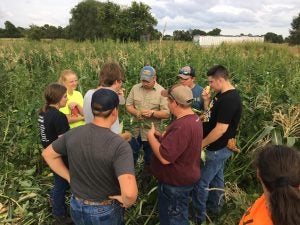Whether it is your first year or your 20th, every year of teaching leads to new lessons. Not only for the kids, but mostly for the teacher. As a teacher, no two years are the same. The kids, experience, and ideas are constantly changing. It takes a lot of knowledge and patience to be a teacher, but especially an ag teacher.
Nathan Isakson with the Ash Grove FFA Chapter in Missouri, and currently in his fifth year as an agricultural teacher said, “You must serve as a voice of reason and make decisions that work for your entire program. You have to support and give back to the community. People are visual oriented, the more FFA emblems they can see in a positive and impressive light will build a steadfast support pillar within your town. As ag teachers we must utilize the best tools available to prepare our students for an unknown future. “
Erin Ruiz, who teaches at Meridian High School in Mounds, Illinois, and currently in her third year of teaching had a different path to becoming an ag teacher. “I teach on what is called a ‘provisional license’ since I didn’t get my degree in teaching, I teach off of my experiences in ag. The biggest challenge for me was to ‘teach’ something I grew up learning on the farm. I also struggled a lot my first year with discipline and classroom management.”
What advice do you have for beginning teachers?:
NATHAN: You can’t quit. You have trained for around 4 years to enter this profession; don’t let rough times keep you knocked down. At the end of the day remember this- yes you are supposed to do your best, but year one is all about survival. By no means does this statement promote negligence, you still have to complete the job to full completion, however your due a few mistakes. You need to have grit. Ag teachers are well respected, develop your core values if you haven’t already. Our world is unstable, and in your storm of a classroom, you must serve as a lighthouse for your students. It is not uncommon for ag teachers to see their students more than their parents do. Whether or not they realize it, your students NEED consistency. In the end, this will keep you honest. Your code of respect, professionalism, overall positive character, work ethic, and problem-solving-team attitude must be ingrained in your core. Students remember the person their teachers were, sometimes more than the content taught.
Be involved in commodity groups (Cattleman’s, Corn Growers, Pork Producers) are a great way to meet local producers and professionals, and you can bring back information for your classroom. (Utilize everything for educational use). Go to USDA, Extension, and other agriculture related meetings to stay in the loop. Also, connect with ag teachers outside of your home state, and keep up with what they are doing. Have a routine. It’s true ag teachers don’t have the same day twice. Who else could teach students how to record farm finance, weld trailer frames, interpret cattle EPDs, set up a banquet hall, use parliamentary procedure, disassemble and reassemble engines, select quality cuts of meat, properly identify plants, develop sales and public speaking skills, and drive the ag bus everywhere? (Just for starters) Have an organizational system. MAKE TIME FOR YOURSELF. You have to take care of yourself. Too many people count on you.
Be an authentic adult of integrity and core values as discussed earlier and the rest will take care of itself. Give clear expectations — day one in the classroom, day one with your officer team, and every time you open the door on a bus to release your students, have a talk illustrating your expectations for a successful day. Leverage opportunity for maximum outcome.
ERIN: Don’t let your guard down. I was told this countless times and I didn’t listen, I wish I would have. You have to start out consistent with your expectations or those kids will run all over you and even when you’re at your third year of teaching at the same school, that reputation is hard to overcome. Also, BUY A PLANNER. Do not try and remember all the deadlines, and dates, and assignments, and missing student assignments.

What would you tell students who are still in college getting their ag education degree?:
NATHAN: If you’re going to be an ag teacher, you have to BECOME an ag teacher. Utilize your available resources to grow the area that you hope to specialize in as a future ag teacher: take course work in that field, earn a minor or even a second degree in that particular discipline. You need to stay current with the ag industry and continue to develop your professional network. TEACH; serve as a teaching assistant for the ag content classes that you enjoyed and have already taken. No matter how many education textbooks you read or papers you write, teaching is still a craft that takes time to develop.
ERIN: First I’d tell them that they are about to start the single most rewarding job they will could ever have. Ag teachers get to be so close to their students and it really feels like a family. Not just with students, but other Ag teachers as well. Never be afraid to ask your fellow Ag teachers for help, chances are, they will share resources. I’d also tell them to MAKE time for YOURSELF! FFA Advisors feel like family with their students because they are usually doing FFA related things more than they are thinking about teaching their class. FFA is fun, educational, and exciting but it is also, time consuming, busy, challenging and will test that procrastinator that still lurks inside of you.
Being an agricultural educator has many perks and rewards for those who are lucky enough to have “teacher” in their tittle. For all you do for our future, we thank you. If you continue to work hard and be persistent with your vision, one day that determination will shine bright.



